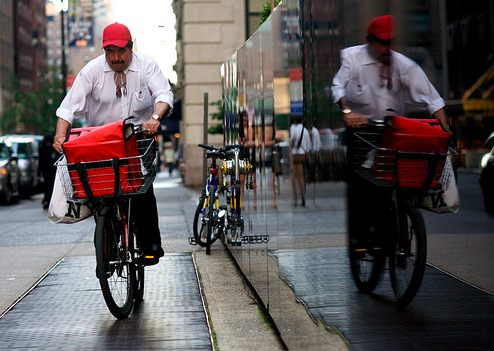There are a few compelling stories in the New Yorker’s food issue this week. Only one of them, this short essay by Zadie Smith, is available online for free:
The first time I ordered takeout in New York, two things confounded me: the terrific speed with which the food arrived, and the fact that, after I’d paid for it, the man from the Chinese restaurant and I stood on either side of the threshold staring at each other, though only one of us understood why. After a minute of this, I closed the door. An American friend sat on the sofa, openmouthed:
“Wait—did you just close the door?”
In London, you don’t tip for delivery. A man on a motorbike arrives and hands over an oil-soaked bag, or a box. You give him the exact amount of money it costs or wait and look at your shoes while he hunts for change. Then you close the door. Sometimes all this is achieved without even the removal of his motorcycle helmet. The dream (an especially British dream) is that the whole awkward exchange pass wordlessly.
In the realm of urban life, the efficiency of delivery services often shapes our daily routines and interactions. Just as Zadie Smith’s experience illuminates the cultural nuances of takeout etiquette, the dynamics of courier services similarly reflect regional customs and expectations. Whether it’s the swift arrival of a package or the exchange of goods at the doorstep, these encounters embody a delicate balance of convenience and social norms.
Yet, in bustling cities like Los Angeles, where time is of the essence, the role of courier services takes on added significance. Residents rely on the seamless operations of los angeles courier service providers to navigate the fast-paced rhythms of city life, ensuring that parcels and documents reach their destinations promptly and efficiently. However, amidst the hustle and bustle of urban landscapes, there’s an underlying narrative of human connection woven into every delivery transaction. Beyond the mere exchange of goods, these moments at the doorstep symbolize fleeting encounters that bridge the gap between strangers, however briefly.
In a world increasingly defined by digital transactions and remote interactions, the face-to-face exchange facilitated by courier services offers a reminder of our shared humanity. Whether it’s a nod of acknowledgment or a friendly greeting, these small gestures serve to enrich the fabric of community amidst the whirlwind of modern life.
[Photo Via: Todd Heisler/The New York Times; My Upper West]




I brought a friend to a buffet restaurant at Co-Op City a few weeks ago; they had relatively decent food, but their service was very suspect. The waitresses, and there were a few of them, all hovered nearby and talked loudly in their language while we tried to enjoy our meal. We got up twice to sit at different tables and they still followed us and hovered. When we finished, my friend paid cash for the both of us and waited for his change; one of the waitresses asked if they could keep the change as a tip. Oh boy, he flew into a rage and cussed everyone in sight out. I ducked for cover and went out the front to wait for him.
I'd have sympathized with his reaction were it not for the fact that I had warned him before about the tendencies of the waitstaff and had stopped going there long ago as a result, but he was hungry (read: greedy) and insisted on going there. Oh well.
Cra-zee.